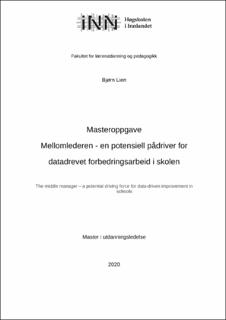| dc.contributor.author | Lien, Bjørn | |
| dc.date.accessioned | 2023-03-10T14:32:09Z | |
| dc.date.available | 2023-03-10T14:32:09Z | |
| dc.date.issued | 2020 | |
| dc.identifier.uri | https://hdl.handle.net/11250/3057773 | |
| dc.description | Mastergradsoppgave i utdanningsledelse, Høgskolen i Innlandet, 2020. | en_US |
| dc.description.abstract | Norsk:
Bakgrunnen for teamtikken i denne masteroppgaven er nasjonale og internasjonale forskningsresultater som viser at vegen til et vellykket forbedringsarbeid innenfor utdanningsfeltet ser ut til å gå via kollektiv kompetanseheving i profesjonelle læringsfellsskap (PLF). To grunnleggende bestanddeler i PLF er gruppenivåets bidrag i organisasjonen og bruken av kunnskapskilder som utgangspunkt for utvikling av skolens pedagogiske praksis.
Tidligere studier viser at begge disse bestanddelene hver for seg kan gi sterke bidrag til skolens forbedringsarbeid. Derfor er det interessant å se nærmere på disse områdene, og utforske om det kan være grunnlag for å koble disse tettere sammen som del av skolens kollektive utviklingsarbeid. Den overordnede problemstillingen for denne studien er: Hvilke sammenhenger er det mellom skoleledelse og datadrevet forbedringsarbeid på skolenivå?
Problemstillingen er undersøkt gjennom ulike forskningsspørsmål. Disse er behandlet i de to artiklene. Artikkel 1 er en kvalitativ studie av et konkret lærerteam ved en barneskole gjennom en kasustudie, mens artikkel 2 bygger på kvantitative data fra elevresultater og brukerundersøkelser av elever og lærere ved en bestemt ungdomsskole.
Hovedfunnene i denne studien er at det ser ut til å finnes et uutnyttet potensial for forbedringsarbeid i skjæringspunktet mellom mellomledelse og analyse av skolens datagrunnlag. I studien av lærerteamet framstår teamledelse som en avgjørende innsatsfaktor, mens de kvantitative dataene fra ungdomsskolen gir grunnlag for å hevde at skolens forbedringsområder kommer tydelig til uttrykk gjennom analyse og sammenkobling av data som skolen har tilgang til.
En datadrevet skolekultur må basere seg på grundige analyser og en målrettet innsats som involverer lærerne. Den beste arenaen for dette er antakelig på gruppenivå, i et velfungerende team ledet av en mellomleder med kompetanse og et mandat til å drive kollektive prosesser. | en_US |
| dc.description.abstract | English:
The background for the subject of this study is national as well as international research results which show that the way to achieve improvement in the field of education goes through, among other things, collective competence enhancement in professional learning communities (PLC). Two basic components of PLC are the contribution from the group-level to the organization and the use of data as a starting point for the development of the educational practice of the school.
Previous studies indicate that both these components can contribute significantly when it comes to the school`s effort to improve. Therefore it is interesting to take a closer look at these areas and explore whether there may be reasons for linking these more closely together as part of the school`s collective improvement. The main aim for this study is to find out what kind of correlations there may be between school management and data-driven improvement work at the school level.
This has been investigated through different research questions. These are addressed in the two articles. Article 1 is based on a qualitative study of a specific teacher team at an elementary school through a case study, while article 2 gives a report on quantitative data from student results and user surveys of students and teachers at a particular secondary school.
The main finding of this study is that there appears to be a potential for improvement efforts at the intersection between middle management and analysis of the school`s data base. In the study of the teacher team, the actual leadership of the team appears to be a decisive factor, while the quantitative data from the secondary school provides a basis for claiming that the schoool`s areas of improvement are clearly expressed through analysis and interconnnection of data that the school has access to.
A data-driven school culture must be based on thorough analysis and targeted efforts involving the teachers. The best arena for this is probably at the group level, in a wellfunctioning team led by a middle leader with expertise and mandate to run collective processes. | en_US |
| dc.language.iso | nob | en_US |
| dc.title | Mellomlederen - en potensiell pådriver for datadrevet forbedringsarbeid i skolen | en_US |
| dc.title.alternative | The middle manager – a potential driving force for data-driven improvement in schools | en_US |
| dc.type | Master thesis | en_US |
| dc.source.pagenumber | 98 | en_US |
